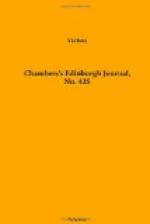There was not a word in this treaty, it will be seen, of a British war in Afghanistan; but the Indian government soon came to enlarge its views, and instead of merely patting Shah Soojah on the back, and setting him upon his countrymen, it determined to take the field in such force as would instantaneously settle the whole affair. The celebrated Simlah manifesto was accordingly drawn up, in which the governor-general gave ‘his most exquisite reasons,’ unpolitely stigmatised by a great portion of the Indian press as a tissue of falsehoods. With this, however, we have nothing to do; our business is with the fact, that before this proclamation had obtained general currency, information had been received that the siege of Herat was raised, and the Persian army on its retreat. This was awkward. The occasion of the intended British invasion of Afghanistan was at an end. No matter. A large and brilliant army was already assembled on the banks of the Indus, and the war must go on! Many persons from the first considered the result doubtful; and Shah Soojah himself had his misgivings, when he found that he was to be forced by Christian bayonets upon a nation of bigoted Mohammedans!
But although the change in the state of affairs in Central Asia made no change in the belligerent resolves of the Indian government, it determined them to reduce the size of the army, and so make a little war instead of a great one. Scarcely had the Army of the Indus, as it was called, begun its march through Scinde, when it was beset with difficulties. ’Between Sukkur and Shikarpoor the camels had dropped down dead by scores. But there was a worse tract of country in advance. The officers looked at their maps, and traced with dismay the vast expanse of sandy desert, where no green pasture met the eye, and no sound of water spoke to the ear. But the season was favourable. Escaping the arid and pestilential blasts of April and May, and the noxious exhalations of the four succeeding months, the column advanced into Cutch. The hard, salt-mixed sand crackled under their horses’ feet, as the general and his staff crossed the desert, on a fine bright night of early March—so cool, that only when in a full gallop the riders ceased to long for the warmth of their cloaks. The distance from Shikarpoor to Dadur is a hundred and forty-six miles. It was accomplished by the Bengal column in sixteen painful marches. Water and forage were so scarce, that the cattle suffered terribly on the way. The camels fell dead by scores on the desert; and further on, the Beloochee robbers carried them off with appalling dexterity. When the column reached a cultivated tract of country, the green crops were used as forage for the horses. The ryots were liberally paid on the spot; but the agents of the Beloochee chiefs often plundered the unhappy cultivators of the money that had been paid to them, even in front of the British camp.’ The Bolan Pass was more formidable. ’The stream of the Bolan




